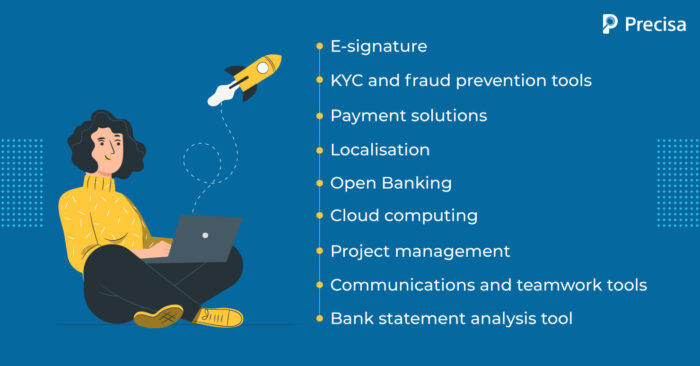9 Must-Have Tools for Fintech Startups

Financial startups! One of the buzzing sectors among a variety of startups. Today every form of financial engagement comes with some or other pain point for both customers and lenders. Hence, we see several innovative solutions in the market that address these issues and make the entire process more seamless.
What’s more? Consumers prefer their engagement with Fintechs compared to other financial institutions off-late. The simplicity of using these solutions is a major reason people prefer them over traditional banking solutions and payment platforms. So, what must-have tools can help financial startups thrive further? Read on!
9 Must-have tools for Financial Startups
The pandemic has accelerated the proliferation of financial startups. No more waiting to get the best out of your fintech business idea. Check out these nine must-have tools for fintech startups.
1. E-signature
Despite not being a requirement for all financial startups, a reliable and trustworthy e-signature solution is essential for companies that deal with enterprise customers. Electronically signed documents are legally binding and easier to use than those printed, signed, and scanned. Companies like DocuSign and YouSign are already catering successfully to American and European markets, while Digital Himalaya and EMudhra are some popular digital signature companies in India.
2. KYC Procedures and Fraud Prevention
Financial institutions, including fintech startups, must comply with ‘Know Your Customer’ regulations. Customer IDs and other documents were traditionally presented at banks during an entirely offline process. But today’s financial services operate primarily online, so they need completely online strategies. KYC tools help financial startups find the customer’s legitimacy, criminal track record, and other details that prove their identification.
3. Payment Solutions
Customers need secure, easy-to-use, and dependable online payment solutions. It is almost certain that you will need one unless you plan to build a payment gateway. There are products such as Stripe, Melio, or Klarna that can handle these needs and can be seamlessly integrated with other systems.
4. Localisation
Many startups want to provide services in multiple languages and expand internationally. By that, we don’t mean translating your business into various languages! Localisation involves adjusting products, content, and services tailored to local markets. Translating your app into foreign languages is not enough; it is also vital to know about user trust in digital banking, payment methods, user experience, visual preference, etc. Fintech startups might find this particularly helpful. Lokalise, for instance, offers tools for automating, integrating, and managing your localisation.
5. Open Banking
A banking practice, open banking, or open bank data, allows you to network your accounts with third-party providers (say, fintech startups). They can access transactional information, consumer banking, and data on savings, credit, and other financial information. APIs are used to facilitate this process, and they are a significant source of innovation in the financial services industry.
6. Cloud Computing
Cloud computing offers servers, storage, databases, networking, and software services as applications. A cloud computing application enables you to utilise these technologies without being an expert in each of them individually. Additionally, the cloud is meant to save startups and businesses money and give them the freedom to focus on growing their businesses. Microsoft Azure, Amazon Web Services, and Google Cloud Platforms are the most popular computing platforms that offer a package of hosted services.
7. Project Management
Plan and delegate responsibilities within the team while also collaborating on different projects. Individuals and teams use project management tools to organise and manage their work systematically and effectively. Project management tools enable teams to work together and reach their goals through agile methodologies.
Popular project management tools like Jira, ClickUp, Trello, and YouTrack can help teams work seamlessly while the projects and tasks are constantly under real-time status updates and quick approval routing.
8. Communications and Teamwork Tools
Effective communication helps build strong teams. Communication improves the efficiency of teams and speeds up project completion. Collaboration tools are meant to facilitate cooperation through an instant connection with team members, therefore, ironing communication gaps via email threads and other routings. Facebook Workplace, Slack, and Fleep are a few collaborative tools that provide various communication and project management features across teams.
9. Bank Statement Analysis Tool
If not all fintechs, most financial startups focus mainly on lending or its associated services. One of the primary tools that helps them move ahead in that journey is a Bank Statement Analyser.
A bank statement analysis tool helps a lender decode a borrower’s financial health. It helps to give a clear picture of the borrower’s creditworthiness and the eligibility to get a loan. When talking about a bank statement analyser, Precisa appears to be an obvious choice for lenders looking to make informed decisions.
Finally, all startups and fintechs aside, the kind of complexities involved in bringing up a financial startup is a whole theory. The above tools can save time, bring efficiency, and model a systematic workflow. That being said, Precisa could help you with its robust bank statement analysis tool for starters and various API integration to enhance the capability. Contact us today to know more!




